#Soft Masculinity=The New Gay Actors of Hollywood
Explore tagged Tumblr posts
Text

SAVE ME, SOFT MASCULINITY. SAVE ME!
#Cillian Murphy#Barry Keoghan#Andrew Scott#Soft Masculinity=The New Gay Actors of Hollywood#The Same Group That Has Been Systematically Destroying Women's Rights AND LGB Rights#Gender Ideology Cult#Irish Mafia#WEF#Solar Cult
8 notes
·
View notes
Text
'I’m genuinely curious about and a little afraid of what is going to happen to a certain kind of film lover when All of Us Strangers comes out in late December. If the reaction to the press tour so far is any indication, expect mass fainting spells and/or riots. There are a bunch of reasons I have pegged this movie—a gay romance from director Andrew Haigh—to bring the Letterboxd crowd, me included, to our knees, but the chief one is that it stars not one but two certified internet darlings: Andrew Scott, best known as Fleabag’s Hot Priest, and Paul Mescal, who rocketed to fame via Normal People early on in the pandemic and has been an object of ardent fan obsession ever since.
Despite the movie’s English director and setting, the other thing Scott and Mescal have in common is that they’re Irish, which you’d think would make their coming together to maximize their joint slay a shoo-in for Irish movie moment of the year. But it turns out competition for that title is pretty stiff in 2023. In November alone, audiences saw Barry Keoghan make his mark on an English country estate in Saltburn and Michael Fassbender scoot through Paris in The Killer, the latter’s first major acting job in three years. This is after a summer absolutely dominated by Cork’s own Cillian Murphy, who played a Jewish American scientist in Oppenheimer with so much conviction that it matters not a whit that no one in history has ever looked more Irish. All of this came in what is still the same year that The Banshees of Inisherin, starring Colin Farrell, Brendan Gleeson, and Keoghan, was nominated for nine Academy Awards, and Mescal was up for best actor for Aftersun.
They didn’t actually win any of those Oscars, but that doesn’t change a growing body of evidence proving that these days, some of the buzziest stars hail from the Emerald Isle. Ask any film fan whom they’re excited about, and you’re likely to get an earful of Mescal, Keoghan, Saoirse Ronan, and so on. I’m not the first to point this out—in August, Elle declared that it was “hot Irish guy” summer. But summer has turned into fall, and the hot Irish guys (and gals) remain with us. During awards season, Mashable made a guide to the Irish “it” boys of the Oscars. Several months later, they’re still “it.” So, what’s the craic with this Irish invasion?
“Irish people tend to be very good-looking and charming,” Rachel Connolly, a novelist and critic who has written about Irish culture’s place in the world, told me via email. “That would have to have something to do with it I’d imagine.”
True, but why are they so good-looking and charming, and so many of them at once? When I asked Ruth Barton, a critic and film studies professor at Trinity College Dublin, what unites performers like Mescal, Scott, and Keoghan, she posited that they all embody “a kind of soft masculinity.”
This wasn’t always the case. In earlier eras of Hollywood, Irishmen played priests and cops, not romantic leads. “Irish actors and Irish identity, particularly Irish masculinity, got sexier around the turn of the century,” Barton said. “The Troubles ended in 1998. You get this new image of Ireland coming through, with the Celtic Tiger, with the boy bands, with the chick lit, with U2, with Bono and all that kind of thing, which changes the image of the Irish male in particular.”
Barton cited Chris O’Dowd’s performance in Bridesmaids—as a cop, which is a typical Irish role, but a sexy one—as a key turning point that paved the way for the ascendance of the Irishman as soulful and sexy male lead. This also then makes room for weirder actors like Keoghan to become fan favorites. “He’s the underdog,” Barton said of Keoghan in Banshees. “He’s not good-looking. He’s not tall. He’s none of those things. But he’s really heartfelt. That’s what he brings to these roles.” (And some people would beg to differ about the good-looking part, I imagine.)
It helps that Ireland is also in the midst of a “huge literary moment,” Barton said. “Sally Rooney is only one of the generation of incredible young women writers coming through.” Rooney, the 32-year-old author of Normal People, is known for portraying “[her] generation’s anomie and discontent” in a way that can also be “viscerally sexy,” Barton said.
And again, this is still kind of a new thing! “Ireland used to be this repressed Roman Catholic country,” Barton said. “We abandoned Catholicism, and then we really let rip.”
Saoirse Ronan notwithstanding, it’s true that the viral “internet boyfriend” phenomenon that so benefits people like Mescal and Scott doesn’t quite have a female equivalent. Still, Irish actresses have been able to take advantage of the spotlight too: Kerry Condon received praise and award nominations for Banshees, Sharon Horgan’s Bad Sisters featured five plum roles for Irish actresses in 2022, with a second season on the way, and we’re still not that far out from the end of Derry Girls, the Netflix show set in Northern Ireland in the ’90s. Irish actress Nicola Coughlan parlayed her role in that show into work on Bridgerton—she will be the lead of an upcoming season—as well as a spot in one of 2023’s most enviable ensembles, Greta Gerwig’s Barbie. (She fittingly played Diplomat Barbie.) Otherwise, Barton cited Jessie Buckley in particular, of last year’s Women Talking, as an Irish actress on the rise.
In a larger sense, for millennials and Gen Z audiences who care about such things, Ireland’s politics seem refreshingly unproblematic: “Ireland stands for nothing on the world stage,” Barton said. “We’re not an aggressor. We’re not a colonizer. The Troubles are over. We actually live in one of a few countries with a fairly stable democracy. We don’t have crazy leaders. It’s a benign kind of identity, Irishness.” In other words, the Irish have all the charm Americans find in a British accent, maybe more—Barton cited a certain richness to “Hiberno-English”—with none of the baggage of the Brits.
Ireland’s history, of course, has trickle-down effects on the national character. According to Michael Patrick Gillespie, a professor at Florida International University who has studied Irish film, Ireland’s past is infused into the whole country’s sense of humor. “They have a great sense of irony,” he said. “I mean, they were an English colony for 750 years. I think that would certainly give anyone a bit of cynicism. There’s a great deal of value placed on wit and on repartee and being able to think on your feet, to think quickly and to deal with ambiguity.”
ADVERTISEMENT That may account partly for why such a small country—it has a population of 5 million—continues to leave such an outsize cultural impression. “There’s a tremendous creative vitality in Ireland, and that fosters a wide range of artistic projects,” Gillespie said. “It also builds up a callus and a stamina because there’s just not a lot of money. There’s never money in the film industry. There’s not a lot to support Irish films. And so to make it, to be successful, you really have to endure.”
Things may be improving on the money front: In February, the Hollywood Reporter published a piece on why the Irish film industry lately seems to be punching above its weight. Some Irish filmmakers pointed to specific funds that have been set up to encourage homegrown talent, leading to projects like Normal People and The Quiet Girl, which was a Best International Feature Film nominee at this year’s Oscars. Barton, meanwhile, pointed out that Ireland also offers quite a bit of state-subsidized theater, so much so that there’s now a fairly well-established trajectory for young actors to follow: After making a name for themselves in theater, they usually move into Irish TV, then parlay that into work elsewhere. When Hollywood productions cast Irish actors, “they’re getting pretty accomplished actors coming in who know what to do, who speak English, and who don’t have to deal with the kind of cultural adjustment either because, you know, we can see American TV here,” Barton said.
And it’s also easier now than ever before to work in Hollywood but stay Irish. “Before, you had to really move to America to work, whereas now people go backwards and forwards very, very easily,” Barton said. “Somebody like Cillian Murphy is very, very insistent that this is where he lives, this is where his children are being brought up, they are being brought up with Irish values, not with American values, etc.” For some American fans, this only makes this class of actors more swoon-worthy for how “not Hollywood” they are.
Still, Gillespie worries that American audiences are at risk of over-romanticizing the simple, quaint Irish life. “I think that Americans have a very naïve sense of Ireland,” he said, a sense that is sometimes amplified by movies like Banshees, in Gillespie’s view. “There’s almost a patronizing view of the Irish that that I think causes many Americans to underestimate their complexity.” In other words, Ireland and Irish actors are more than a vision of a sensitive man who reads poetry in bars or, say, really loves his donkey. “I think American audiences are more than capable of seeing the complexity that is there in Irish films and appreciating the complexities that Irish actors can convey,” Gillespie added. Something to keep in mind while you’re watching Mescal and Scott smooch next month at a theater near you.'
#Jessie Buckley#Paul Mescal#Aftersun#Saoirse Ronan#Cillian Murphy#Andrew Scott#Sally Rooney#Normal People#The Banshees of Inisherin#Barry Keoghan#Saltburn#Fleabag#Hot Priest#Colin Farrell#Brendan Gleeson#Oppenheimer#All of Us Strangers#Women Talking#Oscars#Michael Fassbender#The Killer#Andrew Haigh#Sharon Horgan#Kerry Condon#Bad Sisters#Derry Girls
6 notes
·
View notes
Text
for all leverage fans out there looking for something to watch during this endless quarantine: may I present to you, julie and the phantoms (2020)
literally, this show is so so SO good!!!
let’s go through the characters real quick:
julie molina

pure sunshine. beautiful puerto rican goddess. light of my life.
fashion ICON. loyal as hell. wears paw slippers unironically and tries to scare away cute ghost boys with a cross. amazing singing voice. not afraid to call a bitch out. beats evil ghost curse with the power of love.
luke patterson

soft 90s rock boy. chronic muscle tee wearer. actual puppy. wouldn’t know toxic masculinity if it hit him in the face. lowkey not straight. head over heels in love with julie molina but lowkey is exes with alex (below)
alex harper

gay ICON. I can’t believe he invented being gay. “I’ve always been a little anxious and then I died.” wears a fanny pack unironically and rocks it. sassy but logical af. embarrassed with his two himbo best friends. in love with a ghost skater boy. the holder of the braincell at all times between himself, luke and reggie.
reggie

soft himbo 90s boy. smarter than everyone thinks he is. has a one sided bromance with julie’s dad (her dad doesn’t know he exists but that’s fine). doesn’t like how adults don’t listen to kids so he “haunted” julie’s little brother and aunt to “prove ghosts are real” (if you can’t tell, he was not in possession of the braincell at that time. or ever.)
edit: he is a disaster bisexual
flynn

best friend extraordinarie. willing to cut a bitch for you. doesn’t take anyone’s shit. loves her best friend julie. social media manager for julie and the phantoms. makes some sick music. fashion icon.
willie

gay sk8er boy. died because he thought skateboarding in traffic was a good idea. now sometimes skates in justin bieber’s empty pool for fun. screams in empty museums when anxious. would do anything for alex.
carrie wilson

I have to admit, her songs are bops. ex best friend of julie and flynn. in a music group called dirty candi. daughter of trevor wilson (the old bandmate of the boys). probably a lesbian or at least bisexual. a Demon™ but actually not. hopeful redemption arc in season two.
caleb covington

runs a ghost cabaret called the hollywood ghost club. will steal your soul for one (1) corn chip (he actually steals it for free but let me joke™). musical villain with some MAD BEATS. pretty good skatter. tricks people into selling their souls to him. probably gay.
highkey no one is straight
and oh yeah, did I mention that the boys died from getting food poisoning from street dogs in 1995? because H I M B O S
also this show has the best soundtrack I’ve heard in a LONG TIME
the cast is made up of fairly new (?) actors/actresses and they are all extremely talented and unproblematic. seriously, the cast is great and Pure™ and active with the fandom
it doesn’t have as much of a perfect found family vibe as leverage, but it’s pretty close- especially considering it was only one season! (hopefully more though)
TLDR: watch julie and the phantoms for serotonin
edit: my sideblog is @julieandherphantoms
#also this works both ways: jatp fans should DEFINITELY watch leverage#jatp has been living RENT FREE in my brain since I started watching it like a week ago and I’m already watching it for the third time#I spent like an hour on this instead of working on homework before work#oops#leverage#leverage fans#julie and the phantoms#jatp#reggie julie and the phantoms#alex julie and the phantoms#luke julie and the phantoms#luke patterson#julie molina#carrie wilson#willie julie and the phantoms#caleb covington#juke#mine#recs#show recs
112 notes
·
View notes
Photo

Jennifer Tilly and Gina Gershon Revisit Their Lesbian Neo-Noir “Bound”
By Maureen Lee Lenker
Photos By Austin Hargrave for ET
June 06, 2019
Gina Gershon and Jennifer Tilly aren’t fans of watching themselves on screen — but they’ll make an exception for their 1996 film, Bound.
The Matrix masterminds the Wachowskis made their directorial debut with this noir about two women — femme fatale Violet (Jennifer Tilly) and ex-con Corky (Gina Gershon) — who fall in love and team up to steal $2 million from Violet’s mobster boyfriend, Caesar (Joe Pantoliano).
Bound only made $3.8 million domestically upon its release, but it quickly became a cult classic in the gay community — long before each of the Wachowskis came out as transgender — and it catapulted the siblings to the highest echelons of directors.
We got Gershon, 57, and Tilly, 60 back together at Bibo Ergo Sum, a swanky bar with all the art deco vibes befitting these two femme fatales. There, the actresses vamped it up for a photo shoot, including recreating the iconic Sophia Loren-Jayne Mansfield shot, and had the time of their lives reminiscing as they rewatched the movie together. The enduring warmth of their friendship and their outrageous, heartfelt memories left us fit to be tied.
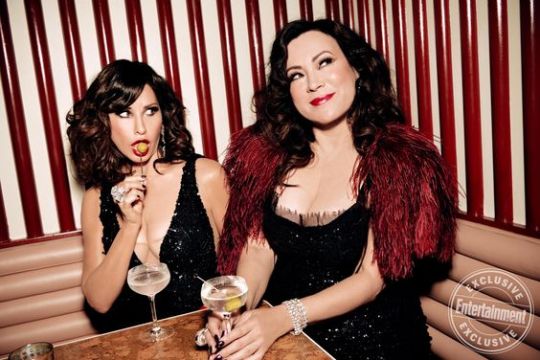
In the first scene, Violet and Corky share a sultry glance in an elevator, and a palpable connection is born — in fact, it’s still present today in their offscreen friendship.
Gina Gershon (Corky): My agents didn’t want me to do it. Literally, I was told, “You are ruining your career doing this movie. We will not let you do this movie.” I never get to play the hero and to get the chick. I mean, it’s the typical part that I’ve watched my whole life, and it’s never been a woman. I left my agents over it. Jennifer Tilly (Violet): I wanted my hair to have a violet sheen, so it’s black but if you see it in the correct light, it’s very dark. I got this nail polish. It had just come out, and I went into Chanel and they said, “Oh, we only have one bottle. We’re saving it [for] somebody, but they were supposed to pick it up yesterday. We’re going to sell it to you.” It was called “Vamp.” All my makeup is like shades of violet, like my lipstick is purple-y. Gershon: I was coming right off of Showgirls, and I was so ultra femme in that. [I cut] all my nails and my hair off, and I started boxing. I had been dancing for five months, so I was so floaty and I wanted to be in my body more like a boxer…Marlon Brando, Monty Clift, Robert Mitchum. I went to all those guys. There’s a certain quietness. I wanted to be like all the guys I project [my ideas of heroism and masculinity] on to. Tilly: It was a classic film noir, except instead of the lead being a male, it was Corky. A studio offered the [Wachowskis] a lot more money to make the movie, but they said that they had to make Corky a man. Gershon: As soon as I met Jen, I thought, “Oh my God, all I have to do is watch her.” She was so amusing and so fun. It’s just so easy to watch her, like her butt and her legs. It made my job easy to kind of objectify her. We liked each other as soon as we met. Tilly: Once they got the two of us in the room, I thought, “This is a girl that I can really see being in a relationship with.” Gershon: You’re the really, truly the only real actress I’ve stayed friends with…
Rattled by her attraction to Violet, Corky goes to a lesbian bar to try to pick up a date as a distraction. It fails though, and Corky stews at home alone while playing her Jew’s Harp.
Tilly: This scene here it was all [advisor and feminist sex writer] Susie Bright’s friends. That’s why the bar scene is so authentic — it’s all lesbians. Gershon: Susie Bright, she was supposed to take me around. The Wachowskis thought it was important that I meet her. She was an authority figure, and [a writer] in the lesbian community. I was really excited to talk to her. Tilly: I never met her. She was pretty much advising Gina. And the thing is, Gina’s character is a lot more hardcore lesbian than Violet. Gershon: We [Gershon and Bright] were going to go cruising around San Francisco. When I got there she couldn’t do it, so she pointed me in the right direction to go to certain bars [on my own]. I just went out and felt the vibe and met people. I actually had a really fun night [Laughs]. I’m definitely not talking about what happened. Just that I felt a lot more confident by the time I got back to L.A. Tilly: She’d come in and she’d be like, “Uh, you know, we need to come up with a new pick-up line. I tried that pick-up line on some chick last night, it didn’t work.” Gershon: I just thought I’d be inspired. I certainly was inspired with tattoos and stuff. I ended up choosing my own tattoos and where I wanted them and all that stuff. Tilly: Somebody said, “Oh, you know, females don’t have any sex organs.” [Susie] goes, “Yes we do; it’s called a hand.” So they did do a lot of shots of hands. Gershon: I really liked the hip [tattoo] that wrapped around my hip and crept up. You saw the top of it coming out of my pants sometimes. I thought that was really sexy. I had seen that on some girl at a bar, and I was like, “Oh that’s hot.” Tilly: That’s also her Jew’s Harp. Gershon: I’m always trying to get my Jew’s Harp in anything! It was the only movie I’ve ever actually had it in there…I needed something in my hands, and I liked the idea of when she’s thinking about the plan, to have something in my hand.

Violet asks Corky, who is at the apartment complex doing plumbing work, to help her fetch an earring she dropped down the sink. It turns out to be a seduction ploy and the two share a steamy first kiss.
Gershon: I’m doing the pipes. I was a little paranoid. I’m definitely not good at any of that stuff, so I just needed to be convincing…I kind of got into it. It’s so dirty and messy, and you’re shoving this thing in the plug. It was fun. I just wanted to look cool, like I knew what I was doing. I liked all the physical activity. It just made me feel like I was doing all the things that I wish I knew in real life. I remember my mom said, “You’re a really good actress.” I asked, “Why?” She said, “Because I believed the plumbing stuff.” Tilly: Look at this, we’re like equals. You know I’m full of s–t; I know that you know I’m full of s–t. We both know what you’re here for. Gershon: Look at your body. Honestly, whenever I wasn’t sure of what I was doing I would just stare at your chest. Tilly: Method actor. [Laughs] The Wachowskis wanted [an] extreme close-up of our lips. We finished shooting the scene, and the Wachowskis had to get a special camera that cost an extra $10,000. The dailies were coming in looking so good, [producer Dino De Laurentiis] finally got [it for them]. So, we went back and shot that — just a close up on our lips. We were a little nervous. I remember Gina was like, “The camera’s going to look up my nose!” But it’s such a beautiful shot. Gershon: I’m so comfortable feeling your boobs. Tilly: This scene where I take her finger — I just thought, “Oh, [I’ll] put it in my mouth!” I improvised that. She’s like, “Oh, where’s this finger going? Oh, it’s not going south, it’s going north. Ok, now it’s going south.”
Later that night, Violet comes to Corky’s truck to apologize for all the things she “didn’t do” to Corky that afternoon, and they kiss again.
Gershon: “I hate women who apologize for sex” — That’s a truthful line. I do hate women who apologize for sex. Why should they be like, “Oh my God, I’m sorry I really like this.” I thought it was a very smart line, because it was truthful, you know? Tilly: [Of all our romantic scenes together, we filmed this kissing scene first.] I had never kissed a girl before, onscreen or off. And I was a little bit nervous. Gershon: I brought her tequila and chocolate before our first scene that we were fooling around. Tilly: I was in my trailer like “an actress prepares,” and I hear, “Knock-knock, I got tequila and chocolate.” Gershon: I said, “Here’s your preparation.” Tilly: We actually had to reshoot that scene, but they said, “Not because you girls were drinking.” There was a problem with the camera work.
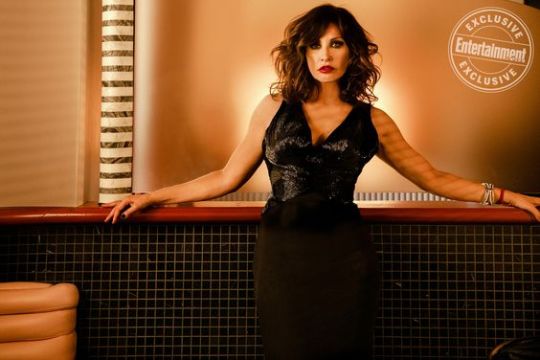
They go back to Corky’s apartment and have sex.
Tilly: A lot of times, as a young actress in Hollywood, you read the love scene, and it seems like the writer is just getting himself off. Like writing three pages of porn. When you’re reading this, it was very matter of fact. Gershon: [The Wachowskis] knew every angle, every cut. They came from doing graphic novels so they really had it in their heads. Tilly: They didn’t want it to be a man’s version. There’s a male version of what lesbians are, and you see it in the soft-core porn movies all the time. They really wanted to get it right. They wanted to be very respectful of the lesbian community. They wanted it to be very, very authentic and raw, not pornographic. Although it was pornographic because we’re hot. [Laughs] Gershon: It was like the four of us having sex. It was like: “Foot! Wall! Head!” It was so choreographed. The camera [is] moving around, and you have one wall go up, another wall went down. Tilly: They wanted to do it in one long continuous shot. They had guys pulling at the walls. It was like a ballet between the Wachowskis, the crew, [and us]. [They’d be] yelling through the megaphone, “Breast!” and then we knew the breast was in frame. Gershon: I knew I had to curl [my toes] on cue. I think it could have been a little bit more connected to an orgasm or to a sexual feeling. I felt it was more a mechanical thing. [But] it was very fluid. No pun intended. Tilly: Gina is like the coolest person to ever do a love scene with. She was playful. I would be like, “Can you put your hand here so my cellulite doesn’t show? Can you prop my breast to make it look a little more plump?” Gershon: In between takes, we’d talk about shoe [shopping], and we were laughing so hard. Tilly: Gina had weights on the set, so before a scene she would work out [with] weights to make her muscles [bigger]. Gershon: Every guy actor I’ve ever seen on set does pushups and stuff if he doesn’t have his shirt on. I was like, “Oh this is what the dudes do, so this is what I’m going to do,” because it kind of pumps your arms up. It’s all very macho too. You know Corky had a lot of armor on, she was very protective of herself. The more I could feel that, the better I felt as Corky. Tilly: We had a lot of problems. We almost got a NC-17. Gershon: There was one take that all four of us were like, “That’s the one.” It was like a real love scene. You didn’t see a boob. You didn’t see anything; it was all suggested. It really played on our face more than anything. Tilly: You can see my fingers on her crotch. You see nothing; you see a hand! Gershon: It was the emotionality. Tilly: [The rating board] said, “It looks like they’re really doing it.” And the [Wachowskis] go, “Let me get this straight. If the girls weren’t such good actresses, you wouldn’t have a problem?” They were embarrassed, and they said, “Yes.” Gershon: God forbid we have these two women actually in love. We had to go with the “f—ing” scene. In the “f—ing” scene, they were really going at it, and it wasn’t as emotional. They were okay with that, which is bulls–t. Tilly: The Wachowskis said, “It’s homophobia, pure and simple.” The shot that we used was so much more elegant. This one’s a lot more graphic. They sprayed more sweat on us. In the last part of the scene, my boob accidentally fell into frame, like, “I want to be on camera too!”
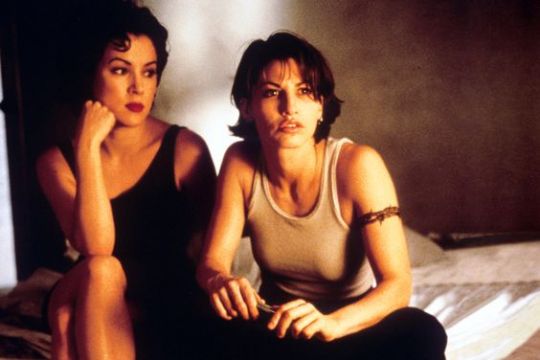
After making a connection, Violet floats the idea of stealing $2 million from her mobster boyfriend Caesar (Joe Pantoliano), which he has left drying all over the apartment after a job gone wrong doused the money in blood. The scene cuts between Violet and Corky as they plot and the action of their plan unfolding in real time.
Tilly: There was a scene where Corky’s putting in all her little burglar tools [in her ears], and they intercut it with me putting on my lipstick and my mascara. The Wachowskis said, “Those are your tools. Those are Violet’s tools and [those are] Corky’s tools. This is how Corky gets by, by stealing, and this is how Violet gets by, by painting her face.”…Afterwards, they sold all the stuff. You go over to Joey’s house, and it’s like the set. He even bought the wallpaper and put it in the hallways.
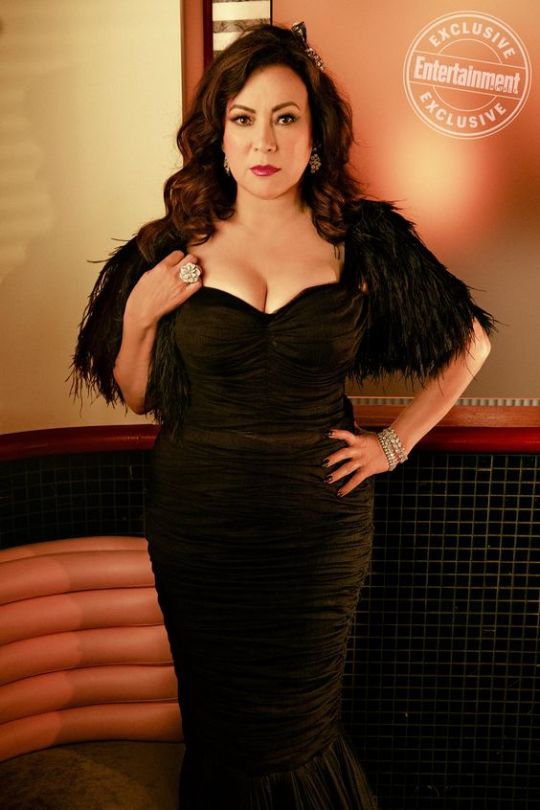
Violet convinces Caesar that fellow mobster Johnnie (Christopher Meloni) stole the $2 million, leading to a sudden bloodbath in their apartment, as he kills both Johnnie and mob boss Gino (Richard C. Sarafian).
Tilly: There was also another shot that they wanted — when the head of the mafia gets shot, they said they wanted him to fall like a mighty oak in the forest. The stunt person said, “Nobody can fall that way, it’s too dangerous.” They had to get another $20,000 dollars from Dino De Laurentiis. They created this machine that was like a lever. So, they put him on the machine and then the lever went backward so when he falls, he falls straight back…Christopher Meloni and everyone, they’re shooting [the place] up, the [Wachowskis] wanted me to duck behind the bar. And I thought, “Oh, here’s where she can show ice water doesn’t run in [her] veins.” So I was going to do a thing like, “Oh she’s remembering when she was three and her mother shot her dad.” I thought This is a really good time for me to lose it. Like, “Oh my God, oh my God!” And they peak behind the bar, and they go, “What the f–k? Jennifer, what are you doing?” And I’m like, “Oh, I feel like I should be very upset here!” And they go, “No. Everything’s going according to plan. You planned it. You’re waiting for it to be over so you can move on to the next step of your plan.”
After Caesar murders his associates, including a mob boss, he realizes Violet has two-timed him and finds Corky next door. They fight; he ties Corky up and dumps her in the closet. But eventually, in the most metaphorical shot, she busts out, and the trio face-off in a final showdown, which Violet ends by shooting Caesar in cold blood.
Tilly: You’ve got to really adore your costar and have a good relationship and a trusting relationship because it’s a really violent scene…[Gina] sprained her wrist or finger or something like that. But you got to go for broke. You can’t be precious, you know? You’re doing fight scenes. You kind of have to go for it. Gershon: I definitely got whacked, and it hurt, but it was an annoying thing because I was just like, “I just need some ice.” But then there’s all this brouhaha on the set with insurance. They’re like, “Oh no, you have to go check it at the hospital.” I didn’t want to leave the set. It definitely hurt, but it would have been fine with ice. I didn’t need stitches or anything. I guess they needed to check that I didn’t break anything, which I didn’t. I just felt really guilty having to leave the set, and I was like, “We don’t have time for me to leave the set right now.” You’re bound to get a little bruised here and there. Not a big deal. Tilly: Oh! She explodes out of the closet! Gershon: I kick out the closet door. It was symbolic for so many women. The whole idea of coming out of the closet. It was very satisfying and very heartwarming. Many girls have come up and said that it helped them come out. It helped change their lives, and that’s really meaningful. Tilly: [The moment where I kill Caesar], they were saying like, “This is a Terminator, ‘I’ll be back’ moment.” Caesar goes, “You don’t want to hurt me. I know you don’t.” And she goes, “Caesar, you don’t know s–t.” They consciously put that in to be like an “I’ll be back” moment and they said, “That’s the Terminator moment when she says that.” It’s also really interesting in terms of some of the underlying themes that men think they know what women want.
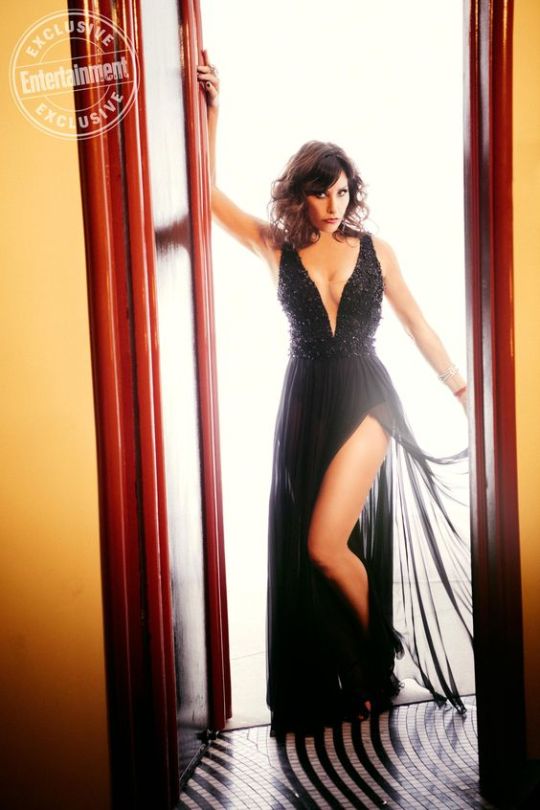
Violet and Corky’s plot succeeds, and they ride off into the sunset together in the brand new red truck Corky bought with their money. All to the tune of Tom Jones’ “She’s a Lady.”
Tilly: That was my dress. Those are my earrings. That’s my watch. I wore pretty much all my own clothes…After the movie, I gave some of the clothes to my sister. The dress, in the last scene, she shows up wearing it [one time] and I’m like, “You know how many lesbians would love to get their hands on that dress. That’s an artifact! It should be in a museum!” She’s like, “It’s my favorite dress!” Gershon: I love the end. I get the chick. I get a car. I get the money. You know what I mean? I was like a real hero. It’s not often, especially at that point, that the women get to be heroes. Those are always the guy’s part. I was just psyched. I’m like, “Hey, I got my girl. I’ve got a new car. We’re gonna go off into the sunset.” It was very satisfying. Tilly: When Gina goes, “Beep-beep” [and we see her new car]. In the audience, everyone laughs. I’m like, “Why is everyone laughing?” And they’re like, “That’s what every guy does when they get some money; they buy a red truck.” Gershon: I was pushing Sinatra, “The Best Is Yet to Come”. I was hearing that in my head, and I think they were toying with that, but then this is what they went with which was great. I mean you can’t go wrong with Tom Jones. Tilly: We had to reshoot the last scene too because, when they were driving away, you could see palm trees reflected in the windshield. Gershon: We always joked about what happens with the sequel. I think they had to split up when the mob was on them, and Violet ends up with some other rich guy at some point. Corky had to leave in order to protect Violet. They struggle, but I think they always come through, you know? Tilly: Everyone’s positive that they’re so in love, and they’re going to live happily ever after, but I really think in Violet’s nature, she’s a predator. I do not think it’s going to end well. Violet’s in love with Corky, but she’s very damaged and I just don’t think it’s going to be like one of those, “50 years ago, we met cute,” you know? Gershon: I’m really proud of this movie, probably more than any other film I’ve done. These women are sexy and they’re smart. They outsmart the bad guys. And they’re funny and witty. They were into each other; they didn’t need a man to help them. That was all a combination no one had really seen before. These parts weren’t around a lot. Tilly: I did have so many girls come up to me — and so many drag queens saying their drag name was Violet. It really made me feel, in a weird way, like I had a responsibility when all these girls would come up to me and say that they came out of the closet and realized they were gay after they saw this film. Gershon: [When we were making it], I kept thinking, “What do you guys, [the Wachowskis] know about being women? How did you write this thing?” And little did I know, at the time, they were really feeling something. They really were feeling bound up inside. So, it became that the metaphor had a deeper meaning. It wasn’t like, “Oh, aren’t they clever writers.” I thought, “Wow, they were going through this, and the world didn’t know.”
Celebrate 50 years of gay pride with Entertainment Weekly’s special LGBTQ double issue, on stands Friday. You can buy all six covers now, or purchase your individual favorites featuring Anderson Cooper, Wilson Cruz, Melissa Etheridge, Neil Patrick Harris, Janet Mock, and Ruby Rose.
#gina gershon#jennifer tilly#bound#PRIDE#entertainment weekly#are you kidding me look at these queens#please please make that sequel i'm begging
103 notes
·
View notes
Text
incomplete list of reasons to love Jude Law by yours truly
(that nobody asked for and that got really long ‘cause I have no self-control and just really love this dork) (updated kinda unregularly but steadily) (also I can provide sources for like 95% of these, so if you have a specific question, feel free to ask me)
charity:
jude does an awful lot for charity but my favorite things include:
he got invited by Peace One Day to say a few words into a camera and felt that wasn’t enough so he spontanously joined their trip to Afghanistan, helping shooting a documentary and played a significant role in establishing peace for a day, to get vaccination and food to especially children, who usually cannot get reached by charities due to the danger of the war zone
he also became an active ambassador for Peace One Day back then and still now, 10+ years later, takes this role very seriously
jude spoke up against the dictatorship of belarus, defending the freedom of speech and of the press, leading to all of his films being banned there
he urged the british government to let refugee children in and personally visited the refugee camp ‘jungle’ several times for weeks to bring the media’s attention to it��
he wrote a letter to the WTO urging them to keep protecting baby seals when the EU thought about giving up the import ban for their fur
he also participated in a project where you pay for the house of someone in an african country and as a reward get shown around the neighbourhood by the person you helped, however the teacher of a near by school heard Jude Law would come to visit the city so she asked him if he would be so kind to make an acting course for the children which he immediately said yes to
jokingly got asked by a woman/fan he just met if he could sponsor her in a charity run and he immediately said yes
when he was working with aspiring actors and directors, who were all children/teenagers for a charity event, he informed himself about their previous and current projects beforehand to be able to talk with them about it and encourage them futher
when he found out about a teenager making a small documentary about freedom of speech, he immediately called him personally and offered an interview with him, making the guy’s life (and film)
he plays an active role in providing free theater tickets to children in Lewisham, London, which is rather poor part of London in which he was born and grew up with, to help less fortunate kids to be able to experience art as well
generally speaking he thinks it’s important to use fame to get the media’s attention to important issues and help to fix them
not exactly a charity thing but he is really polite and helps people a lot, e.g. he once stopped giving autographs to fans to carry heavy boxes for a struggling elderly woman nearby only to come back to the fans once he was finished helping her
he is such a family man:
it felt completely natural for him to settle down at the age of 19 with a woman who is seven years older than him and already had a four year old child
he bought a lot of his sister’s paintings and hung them up at home because he loves and supports her
he often takes his mum and/or dad with him to events
said nothing makes more a man out of you than when your will gets broken by your 1-year-old daughter
when he is driving alone, he always turns on the radio channel his kids always listen to because it reminds him of them and makes him feel like home
he made his agent angry with him because he turned down Hollywood blockbusters early in his career to have more time for his family
he spends as much time with his family as possible
even when he is in another country, he makes sure they can either fly to visit him or he can fly back home as much as he/they wants/want
generally he just loves the domestic life and being surrounded by his kids, having to cook for them, getting them to school etc
he also really loves cuddling them but respects if they don’t want to
he is (by far) the strict parent because it’s incredibly important for him that his kids have good manners and are polite
still makes sure they know how much he loves them and that they can always count on him if they need his help
missed out one of AGOS press conferences because his 10 y/o son had a local football match and that simply was more important to him
and a goddamn nerd:
he named his first daughter after his favorite author
and is a comic book nerd in general
when he got gifted a copy of the complete peanuts for his kids, he decided to keep it for himself because he really really loves the peanuts
he also has/had a snoopy jacket
and bought a dog sculpture called snoopy
at a young age he already had an ridiculous amount of knowledge about films from the 20s
he got a fandom tattoo at the age of 18
and loves childrens literature
is a huge fan of cartoons and kids films as well
always loved shakespeare, even as a child in school, because the language he used felt natural to him
he once kept his favorite poem first on his fridge and then above his bed
his work ethics and the way he behaves on set are beautiful:
bothers to learn the names of everyone on a film set and is totally willing to listen to them if they want to talk to him
is generally always described as warm and welcoming towards anyone
randomly takes film crew members out for dinner
he was very parental towards the kids in The Holiday, “pop his head round the door when [they] were doing [their] schooling”, chatted with their dad etc.
he and Cameron also made the effort to get the personalized denim jackets made with inscriptions of their names and “The Holiday” and “Hollywood 2006,” once the shooting was over and gave them to the girls personally
he always wanted to be known for his acting not his looks
when shooting the film wilde (1997), stephen fry was afraid his co-stars would feel uncomfortable during sex scenes with him, so jude and the two other actors made sure fry felt comfortable and was at ease
he is always hard working
and does tons of research for his roles and even writes entire essays about his characters
to play Albus Dumbledore, he watched footage of Picasso painting as he wanted to observe the brush movements to get a a good feeling about how to use a wand
jude is always looking for a new challenge acting-wise
and really nervous about his skills everytime he is at a new set so to distract himself he simply talks to everyone
he always panics at first when joining a new project but eventually calms himself down and reminds himself to just do his best
even when he was one of the best paid actors in the world, he still worked on films with smaller budgets that would have never been able to pay him the amount he could demand, because he always cared more about working on projects he cares about than making the most money out of it
other random facts about him that are just adorable:
he pretty much ha sno tolerance for toxic masculinity

jude often spends the weekend on the couch reading and falling asleep a lot
he reads an awful lot in general and often gives book recommendations in interviews (you can find a list of his recommendations here!)
he writes and paints in his freetime
his superpowers in real life are being patient, really good at making chocolate cakes and able to fall asleep anywhere
jude really loves food too (from pretty much every country)
he uses his natural charm to make the people surrounding him feel secure
and often pulls faces in pictures

he is currently trying to learn how to play the piano
and thinks it’s important to be able to laugh about oneself (especially as an actor) and does so a lot
so when he became sexiest man alive, his friends gave him toilet seat with his picture printed on and he kept it
but he always tries to hide his face when he gets embarrassed

he supports equal rights for everyone and is really open-minded in general
jude is interested in fashion but also keeps wearing the same things for like a decade
he hates people who just throw their litter on the ground because that’s “disrespectful”
and just mean people in general
he is really really warm and soft
he thinks it’s important not only for little girls but also little boys to grow up with films like Captain Marvel so they all learn women in positions of power are right
jude is always up to date when it comes to things that matter like politics and theater but has absolutely no clue about internet/social media culture

he gets really along with children in general
he said romance means an awful lot to him
he has a huge crush is Judi Dench
he is really into spicy found so he pretty much carries a bottle of tabasco with him everywhere to be able to flavour the food he orders like he wants to, instead of bothering the cook about it
he even takes one with him on planes
when asked what he thinks about Caitlyn Jenner changing her sex he said he doesn’t know what to say other than ‘good on everyone’ (after he talked about how he basically lives under a rock and had no idea who she was)
he always has to picture the cardinal directions in order to remember them

and often tries out new things while cooking
jude doesn’t give a damn about what’s considered “manly”
and hates the word ‘bromance’
he is a really passionate person
his voice sometimes breaks when he is laughing
and he uses his entire body while laughing

he respects other cultures and is always happy to try something new
he always stands up when a woman enters the room
jude is incredibly positive and loving
when asked if the world is ready for a gay children’s icon (Dumbledore), he said he thinks it’s ready and that if it isn’t it “bloody well should be”
he never excuses his mistakes or runs away from them but instead admits he fucked up, apologizes and tries to make up for them
his excitement and enthusiasm is really childlike


when an interviewer tried to be funny and asked who he is, he thought he really just didn’t know and replied politely with his name and offered him his hand because he is just such an humble idiot
he once got asked if women need to wear high heels to be attractive (in his opinion), he said that every woman is attractive when she is herself so it really doesn’t matter what she is wearing
when he had to choose a winner in a cooking contest, he felt so bad for the losers, he had to hug them


TL;DR: Jude is a fucking gem, protect him.
#im............so sorry for the lenght but writing this down kinda made me happy idk lmao#jude law#personal stuff#jl list#long post#jude
325 notes
·
View notes
Text
LUCY AND WALLY COX
S2;E21 ~ February 9, 1970
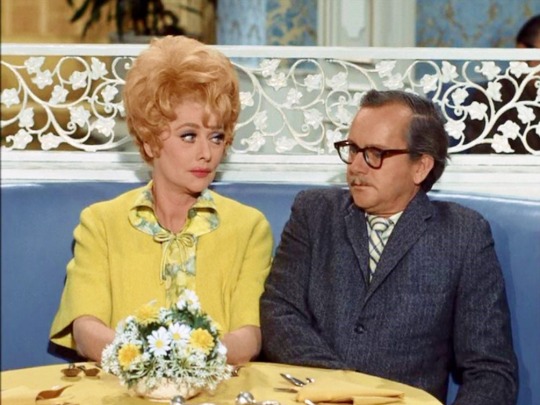
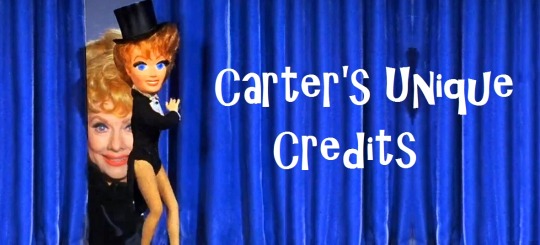
Directed by Jay Sandrich ~ Written by Milt Josefsberg and Ray Singer
Synopsis
Harry's old friend Moose has a shy son who Lucy helps bring out of his shell – until a plan to help him bravely foil a robbery goes awry!
Regular Cast
Lucille Ball (Lucy Carter), Gale Gordon (Harrison Otis Carter)
Desi Arnaz Jr. (Craig Carter) and Lucie Arnaz (Kim Carter) do not appear in this episode, although they are billed in the opening credits.
Guest Cast

Wally Cox (Wally Manley) was a character actor best remembered for being a panelist on TV's “The Hollywood Squares” (1965-73) as well as his hit series “Mr. Peepers” (1953-55). He played a nervous musician on “Lucy Conducts the Symphony” (TLS S2;E13) and a reformed safe cracker in “Lucy and the Ex-Con” (S1;E15). He will make two more guest-star appearances on “Here's Lucy.” Cox died of a heart attack in 1973 at age 48.
Cox was known for playing less-than-masculine characters, so the name ‘Manley’ is a bit of an inside joke. Despite being billed in the title by his real name, Cox never played himself on his many guest appearances with Lucille Ball. Cox’s character doesn’t enter the story until 10 minutes into the 24 minute program and receives a warm round of applause from the studio audience.
LUCILLE BALL: “I adored Wally Cox. I worked with him every chance I got!”
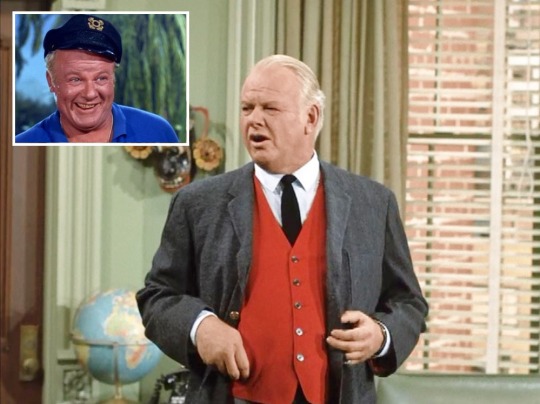
Alan Hale Jr. (Moose Manley, Wally’s Father) is best remembered as the Skipper on “Gilligan's Island” (1964-92). Hale previously appeared as a Fire Captain on “Lucy Puts Out a Fire at the Bank” (TLS S2;E9) the year before he started playing the Skipper. Hale made his film debut at age 12. He died in 1990 at age 68.
Moose and Harry are old college buddies. He runs a detective agency with branch offices in 30 big cities.

Chuck Hicks (First Stuntman, left) was a stunt man and actor who was seen in “Lucy the Stunt Man” (TLS S4;E5). Hicks was a long-time stunt double for Brian Dennehy. This is his only time on “Here’s Lucy.” Boyd Red Morgan (Bruce, Second Stuntman, right) is an actor and stunt man who was last seen in “Lucy and John Wayne” (TLS S5;E10), with whom he did eleven films. This is the first of his four episodes of “Here’s Lucy.”
In the 1970s, the first name Bruce was the generic name of a stereotypical gay man (complete with limp wrist and a lisp) in jokes about homosexual males. Here, Harry twice questions the name incredulously, having a hard time associating it with a masculine stunt man. The 1969 studio audience laughs, indicating they also make the connection.
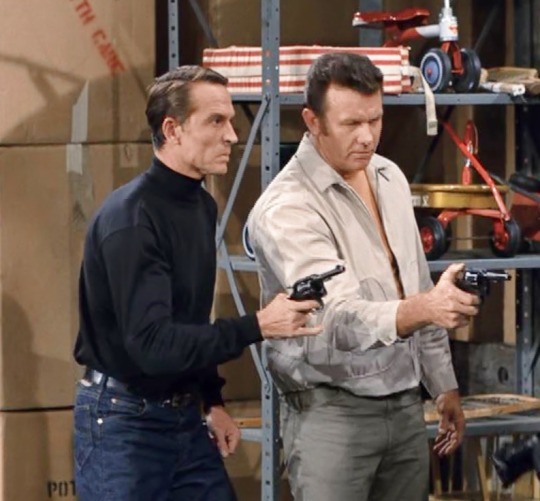
Gil Perkins (Baby Face Johnson, First Crook, right) was aboard the train when Lucy and Ricky headed home from California in “The Great Train Robbery” (ILL S5;E5). Prior to that he was seen in The Big Street (1942) and The Fuller Brush Girl (1950) with Lucille Ball. This is his only appearance on “Here's Lucy.” X. Brands (Lefty Logan, Second Crook, left) was his real name! A family tradition held over from when an ancestor added the letter ��X’ to his name to differentiate himself from another man of the same name in town. X Brands was known for playing American Indians, despite not being one. This is his only appearance with Lucille Ball.
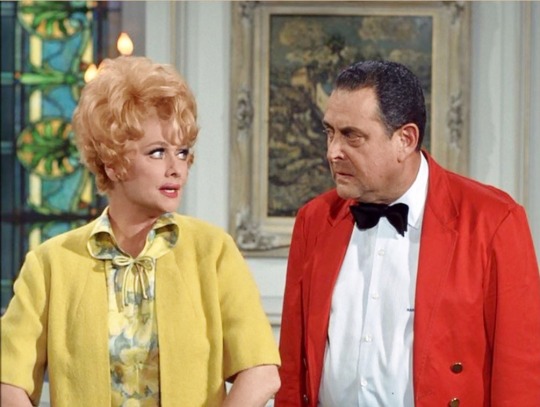
Harvey Stone (Waiter) was born just three weeks after Lucille Ball in 1911. He had appeared in two plays at New Jersey's Paper Mill Playhouse in 1968. He will be featured in one more episode, also directed by Jay Sandrich. In 1974 Stone died of a heart attack while performing on a cruise ship and was buried at sea.
The waiter has no dialogue, but his face says it all!
There are a few diners in the background of the Cafe George, but their faces cannot be seen.
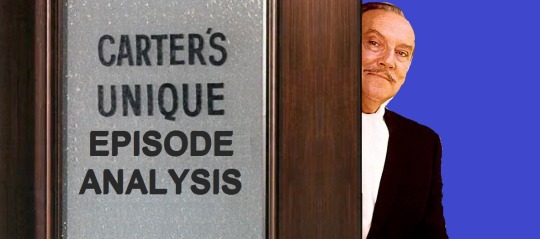
This is the first of three episodes to be directed by Jay Sandrich. The year after this episode, Sandrich won an Emmy Award for his writing on “The Mary Tyler Moore Show.” He won again for the same show in 1973 and earned two more Emmys for his writing on “The Cosby Show” in 1985 and 1986. Sandrich first joined the Desilu team in 1956 as Assistant Director of “I Love Lucy” and “The Lucy-Desi Comedy Hour.” Sandrich remembers:
“I was so young and caught in the middle of America's favorite couple breaking up. Psychologically, I didn't know how to handle it because I was in the middle. They all were wonderful people but naturally there was tension.”

In April 1968, Gale Gordon joined Wally Cox as one of “The Hollywood Squares.” Host Peter Marshall had played Lucy Carmichael’s brother-in-law on “The Lucy Show,” so Marshall and Gordon had that in common! Marshall would also star in “Happy Anniversary and Goodbye” in 1974. Also in the grid that week was Jack Cassidy, who had guest starred on “The Lucy Show” in 1965.
Although Hale and Cox play father and son, they were only three years apart. Moose Manley says that his son is 33 years old. In reality, this episode was aired a week before Wally Cox celebrated his 45th birthday.

Moose says that in college, Harry was known as ‘Blubber’ because he was overweight and adds that Harry still holds the college record for swallowing 86 goldfish in ten minutes. Goldfish swallowing was a fad of the 1920s and ‘30s college students probably during initiation rituals or on dares. This unusual trend has been previously mentioned on other “Lucy” shows. Harry later recalls that they went on panty raids, another college stunt popular with fraternity boys during the '20s and '30s.

When Harry thinks Moose is using blackmail to allow Lucy time off to help his son with his girl problems, Moose replies “You bet your bippy it is!” The word “bippy” means “ass” and the euphemism was used as early as 1880, but was re-popularized by “Rowan and Martin's Laugh-In,” “Here's Lucy's” competition on ABC. In May 1969 a song titled “You Bet Your Sweet Bippy” was released. This is just one of many “Laugh-In” references on “Here's Lucy.”
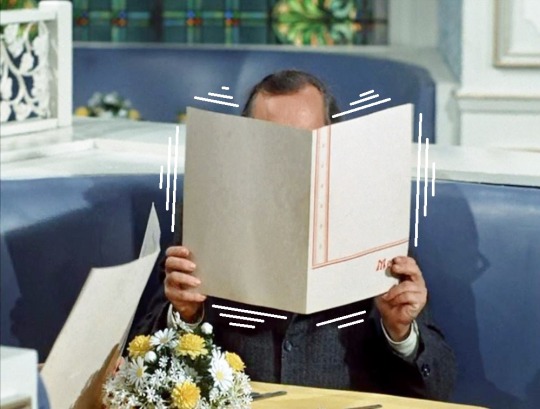
Story Time with Hilda & Madge - When Lucy hears that Wally is afraid of girls, she relates a story of a high school friend named Hilda who had a girl-shy brother. Moose blackmails Harry by threatening to tell Lucy a salacious story about a girl in Harry’s past named Madge.
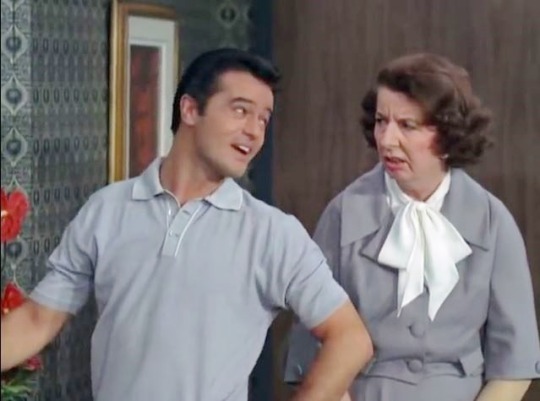
Moose gets a phone call from his secretary, Miss Hurlow. Miss Hurlow was also the name of Robert Goulet's secretary who was played by Mary Wickes in “Lucy and Robert Goulet” (TLS S6;E8, above).

After the two stunt men completely destroy Harry’s office, one of them says “We’ve got to get it out of our systems. We’re not allowed to be violent on TV anymore!” In 1969, the National Commission on the Causes and Prevention of Violence submitted a report that brought television violence under careful scrutiny. That same year, Senator John Pastore requested that the Surgeon General appoint a committee to conduct an inquiry into television violence and its effect on children. Clearly this topic was in the news, and as a result gets a laugh from the studio audience.

The warehouse seems to be stocked with children's toys and games (as well as lamps and boxes of nylon). The Ideal board game Seven Keys can be seen on the table near the door. It was based on the TV game show of the same name (which, in turn, was based on Chutes and Ladders) that ran from 1961 to 1965 on ABC and was hosted by Jack Narz.
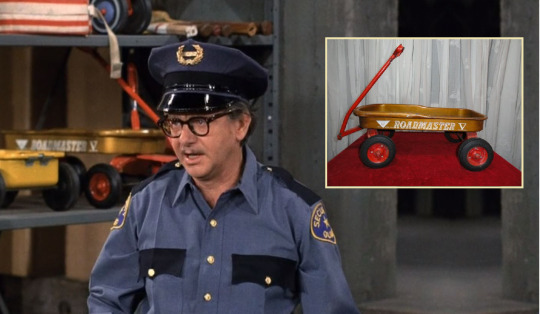
There is also a Roadmaster V gold wagon by AMF. American Machine and Foundry (AMF) Roadmaster division was primarily known for bicycles, but also created many wheeled children’s toys. This is the fifth iteration of their gold pull toy wagon, manufactured in the 1960s.
As usual, Lucy has no control of hoses and Harry ends the episode soaking wet! To be fair, so does Lucy!
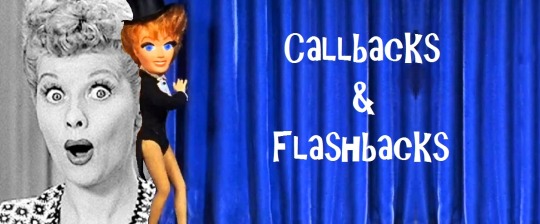
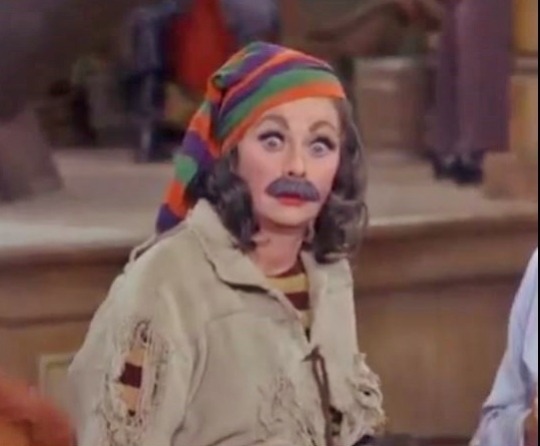
Episodes featuring stunts recall when Lucy Carmichael took a job as a stunt person named Iron Man Carmichael on “The Lucy Show.” In “Here's Lucy,” however, Lucille Ball leaves the stunt work to others!
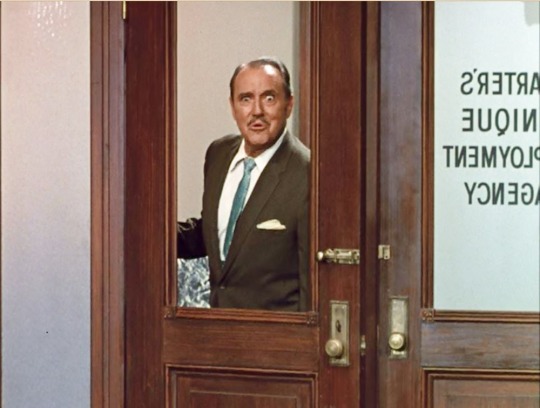
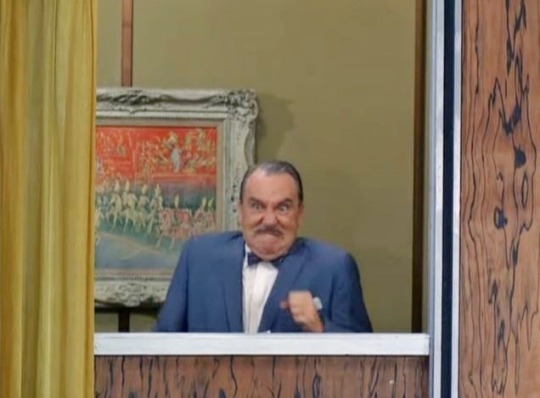
The gag of Harry’s glass door shattering was previously done to Mr. Mooney on “Lucy Gets Involved” (TLS S6;E17).
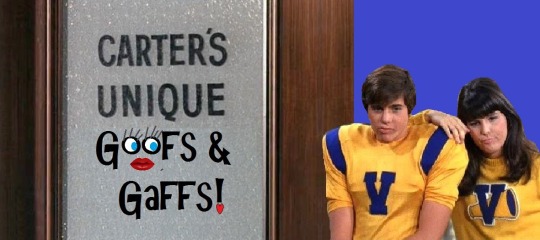

Oops! Picking up the menus, Lucille Ball knocks over the salt and pepper shakers. Nothing spills out (likely they were empty) and Lucy doesn't bother to right them, knowing that the entire contents of the table will soon end up on the floor anyway!
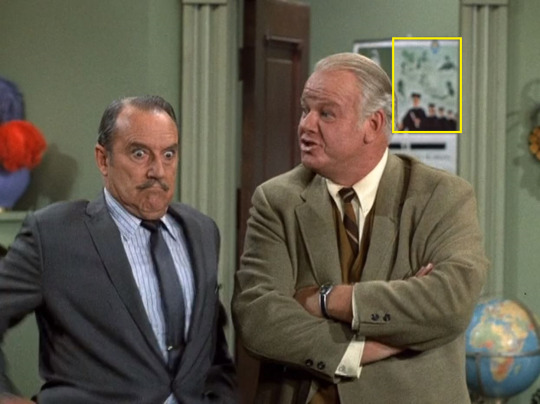
What Month Is It? Although the episode aired in February, the calendar in the storage room shows artwork of a line of graduating students in black cap and gown holding diplomas, usually indicative of May or June. The calendar year remains in soft focus throughout.
What's My Line? Moose says he runs a detective agency, but is here supplying security guards for a warehouse, quite a different business!
Wanted Dead or...? Moose recognizes Baby Face and Lefty as “the most notorious killers in the country.” If that is so, why are they robbing toy warehouses? Also, they are armed with guns yet are easily overpowered by Wally and Lucy who only have toys to defend themselves!
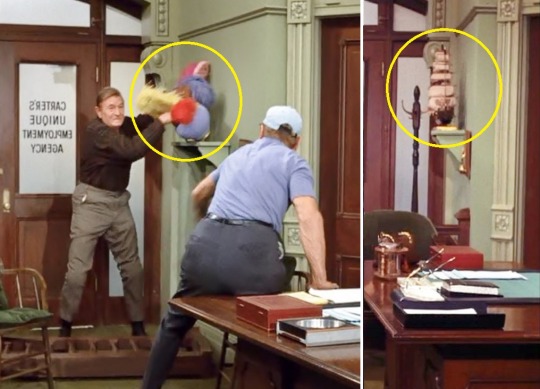
Redecorating! The model ship that usually sits on the shelf next to the office doors has been replaced by colorful vases and feathers. This is because the stunt men are going to wreck the office and need breakaway glass for their demonstration. The water cooler has also been removed for this episode.

Where The Floor Ends! During the destructive demo, the camera pulls back a bit too far revealing where the edge of the wall-to-wall carpeting meets the cement of the soundstage floor.

Gimme a Break (but not yet)! The glass in the door shatters while Harry is opening the door to leave, instead of when he shuts it, slightly marring the timing of the gag.
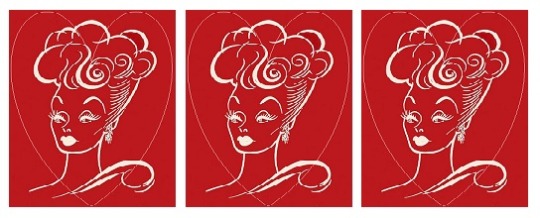
“Lucy and Wally Cox” rates 3 Paper Hearts out of 5
This is a moderately enjoyable episode, if only to see TV favorites Cox and Hale play an unlikely father and son. It isn't particularly funny, however, and the outcome is predictable. There are also dated jokes about masculinity that haven’t aged very well.
#Here's Lucy#Wally Cox#Lucille Ball#Alan Hale Jr.#Gale Gordon#Jay Sandrich#Ray Singer#Milt Josefsberg#Chuck Hicks#Boyd Red Morgan#Gil Perkins#X Brand#Harvey Stone#Security Guard#Goldfish Swallowing#Panty Raids#Seven Keys#Stunts#Stunt Men#Crooks#1970#TV#CBS
7 notes
·
View notes
Text
PATTON PENDING - My Review of SCREAM, QUEEN! MY NIGHTMARE ON ELM STREET (4 Stars)

[Excerpted from https://thequeerreview.com/ ]
I have a very rare and unusual relationship to A Nightmare On Elm Street 2: Freddy’s Revenge. Long considered the gayest horror movie ever made, its homo panic subtext, which really just plays as text, feels unmistakable through a modern lens, but back then? It depends on who you ask. I should know. I was there.
For much of the 1980s, I worked in production on films, and New Line Cinema offered me a job on their rushed-out sequel to their instant horror classic about a man named Freddy Krueger who haunted people’s dreams. When I read David Chaskin’s script, I was floored by its depiction of a male scream queen named Jesse who freaks out whenever he gets intimate with a woman, races off to spend the night with his hot male best friend, experiences dreams set in leather bars and in the showers with his naked, tied up coach, pretty much invents twerking, and bemoans the fact that, “Something wants to get inside my body”. As played by Mark Patton, Jesse spoke for every queer kid who didn’t have the words to express his feelings. In1985, when the film was made, few could articulate what seems so blatant now. Still, all it took was a sideways glance to other crew members as we watched Freddy caress Jesse’s face with his knifed glove to understand the film we had in store for an unsuspecting public.
Elm Street 2 derailed the promising career of Patton, sending him virtually off the grid for the past thirty plus years. Scream, Queen!, the new documentary by directors Roman Chimienti and Tyler Jensen, initially takes us on a deep dive into the homoeroticism embedded into the sequel. Had it stopped there, we would have had a delightful fan service documentary. We hear from its director Jack Sholder and cast who all had their own take on the material, enough to send you home chuckling knowingly at what you knew was there all along. The film instead wisely chooses to take a more global perspective as we take Patton’s journey from failure and resentment to finding his voice and giving birth to a strong, stirring activist for LGBTQ+ rights. Who knew he had THAT inside his body?!!
Patton, who had just triumphed on Broadway and in film with his performance in Come Back To The Five And Dime, Jimmy Dean, Jimmy Dean, scored his first lead role with Elm Street 2, and clearly had the talent to go far. Unfortunately, his rise came during a particular time in Hollywood history when even the whiff of gayness could keep an actor from working. In auditions, such comments as “too soft” meant Casting Directors thought you were too gay to play straight. The implied message? Gay is bad. Gay doesn’t sell tickets. Get that gay away from me! It didn’t help that the AIDS crisis reared its ugly head, sending shockwaves of paranoia throughout the industry. Once the film came out, Mark couldn’t find much work, so he retreated from the business and moved to Mexico.
Unbeknownst to him, Elm Street 2 developed a cult following years later, with fans recognizing its unique place in horror history. Soon, Patton started making the rounds at horror conventions, which sent him on his quest to understand what happened and why. Scream, Queen! methodically takes us along with Mark as he meets fans, embraces his iconic dance in the film, thus learning how to laugh at himself. Some documentaries would end here as we look back with clear heads at something so absurd, but Chimienti and Jensen stand by Patton, who wants more answers. He seeks an apology from Chaskin, who had put the blame squarely on his shoulders for anything and everything gay in the film. He suffers through some mansplaining by Jack Sholder, who thinks Mark should simply drop everything. Neither, however, come across as villainous. Both simply never had the tools or the awareness to examine themselves properly. Mark, steadfastly wants to better understand how homophobia ruins lives and how perceptions of masculinity and femininity create unreasonable gender norms. Once a closeted actor, Patton stands firmly out about his sexual orientation and his HIV+ status, and with zero fucks left to give, he won’t back down from people who tell him he has to just let it all go.
I also went on a similar journey with this film. Mark and I didn’t really get to know each other during production. He would barely make eye contact, perhaps afraid he be “seen”, or maybe he just had too much on his mind. We really didn’t strike up a friendship until we met again at a party in the late 1990s. He spoke of the inequities surrounding that film, and it brought back my own memories and feelings. About 5 years ago, I happened to be at a film festival in Savannah, Georgia, and ran into Bob Shaye, the film’s producer. I told him he wouldn’t remember me, but I had worked on his movie. He asked me to join him for drinks and couldn’t have been sweeter. My interactions with Mark gave me the courage to ask him why he and the other filmmakers had denied Elm Street 2 had any intentional homoerotic undertones when it was so obvious even at the time. He copped to it being a business decision. Laughing, he said, “And in that bar scene, I was wearing a harness from The Pleasure Chest!” I laughed along with him and thanked him for his candor. Mark, whose evolution we witness in the documentary, may have laughed too, but he would also likely have looked at Shaye, with all of the hurt three decades of outrage can muster, and said, “It affected me.”
Some moments in the film verge on narcissism, such as when Mark tells someone, “This is all about me”. For a moment, I thought he needed to take it easy as well. In sticking to his guns, however, Mark keeps refocusing the arguments so that, finally, people truly see him. By seeing him, they see us. Ultimately, it’s an amazing act of generosity, a gift he gives us by exposing us to his raw, true feelings. It moved me to tears. I didn’t think I’d get that from an exposé about a campy horror film.
Mark stands up for anyone who has been bullied, who has lost a job, or anyone who has been held back and learns to say, “No! Don’t tell me to get over it. It still matters. It still hurts. The only solution here is to apologize and be kind to me.” It’s through this process that we discover a man who brings more to the table now than he ever did before. He and his team have brought us an important, expansive documentary which finds an articulate, grown-up path forward for the LGBTQ+ community. What Mark Patton does from here, I suspect, will be more dream than nightmare.
0 notes
Text
HOW VIETNAM CINEMA RESPONDS TO THE AESTHETICS AND ECONOMICS OF ‘HOLLYWOOD’ CINEMA
In 2017, only 35 Vietnamese films were screened in national cinemas compared to 91 American ones (Nguyen 2018). To counter the Hollywoodization, Vietnam government has put a lot of political and economic efforts to develop the domestic film industry. The government applied Đổi mới (“Renovation”) economic reform that called for privatization and foreign investment into the industry (Vo Hong 2012), while instituting a fixed quota for domestic products in the national cinemas (Nguyen 2018) and welcomed back overseas Vietnamese (known as Việt Kiều). The industry itself also adapts Hollywood aesthetics and economics to appeal to young people who are familiar with American pop culture products while trying to keep the national identity.
To begin with, Renovation economic reform in 1986 and political normalization of Vietnam-America relations in 1994 brought Hollywood to Vietnam. After 20 years of cold war, Hollywood is the new tool for the American government to conquer Vietnam. As defined by Joseph Nye (2004), one resource for the exercise of soft power is culture since a country can gain the political outcomes if other countries adore its values, imitate its example, aspire to its level of prosperity and openness.
These two policies at the same time offered a solution to counteract Hollywood by introducing more competitors. Following 1994, booming trade happened between Vietnam and America, and many other countries that were allies of America. The cinema industry underwent privatization and witnessed an influx of abroad media, labor, and capital and a surge in multinational co-production financing (Vo Hong 2012). Before 1989, cinemas and film productions were state-owned (Vo Hong 2012); but then, by the end of 2017, there were 630 cinemas, of which 65% are foreign players (the most notable one is CGV from Korea with 40% market share) (Kien Anh 2018).
Continuing the effort of Renovation, while the state still provides budgets for selective art films, the government encourages film funding and investment from the private sector and foreign players. Vietnam Entertainment Fund (VEF established in consultation with VinaCapital, is the biggest investment fund in Vietnam with the market capitalization of $50 million. It follows entertainment fund models in developed countries, such as CA-Cygames Anime in Japan and Marvel Studios in the U.S. (Minh Nga 2018).
Besides, the government set up goals for the number of domestic films to reach. Up to 49% of the films screened in Vietnam cinemas are from America in 2017(Nguyen 2018). Therefore, the exhibition rate of Vietnamese films in cinemas, the number of cinemas and audience size/diversity should be increased (UNESCO 2016). In 2017, the fixed quotas of domestic productions in national cinemas was 20% of the total to counter the dominance of wildly popular Hong Kong action movies and Hollywood blockbusters (Nguyen 2018). This number is expected to reach 45% by 2030 (UNESCO 2016).
In recent years, the government put intensive effort into draw Việt Kiều talent back to Vietnam. Resolution 36 and the establishment of the Committee on Overseas Vietnamese in the Ministry of Foreign Affairs urge diasporic Vietnamese (those studying and living abroad or having fled Vietnam after the fall of Republic of Vietnam) to contribute to the liberalization of the country’s economy with their skills, financial assets and ties to education abroad institutions. Experienced Hollywood filmmakers and actors are especially welcomed to the cinema industry (Nguyen 2018). Notable Việt Kiều directors are Tran Anh Hung with Mùi đu đủ xanh (Scent of Green Papaya), Tony Bui with Ba Mùa (Three seasons), Charlie Nguyen with Dòng máu anh hùng (The Rebel (2007), Victor Vũ with Tôi thấy hoa vàng trên cỏ xanh (Yellow Flowers on the Green Grass), etc. With this strategy, the cinema industry is no longer confined in Vietnam border but goes beyond all over the world to Vietnamese overseas community.
The fact that young people adore global images of American pop culture urges the state to vary the domestic film categories and filmmakers to adopt American film production model. Once dominated by films about war with nationalistic narratives, the film industry is transforming into a transnational, multi-genre and multi-style cultural realm (Vo Hong 2012). The goal is by 2020, produce 40-45 feature films per year, 36-48 films per year for each type of documentary, scientific films, animated films (UNESCO 2016). To make Vietnam films appealing, Vietnamese filmmakers invest more in marketing and distribution, and insert relevant Hollywood aesthetics into their films(Vo Hong 2012). Hollywood consumer-based formula focuses on the theme of sex, violence, and alcohol (Rampal 2005), which worked well in current domestic hit films such as Để mai tính (Fool for love), Dòng máu anh hùng (The Rebel), Em chưa 18 (Jailbait), Âm mưu giày gót nhọn (How to Fight Six Inch Heels). In the rest of the essay, I will explore how Charlie Nguyen’s Fool for love (2010) and The Rebel (2007) respond to Hollywood influences.

Charlie Nguyen is a screenwriter and film producer, who hails from Orange County, California, where he used to work with Vân Sơn Entertainment making music variety show CDs and DVDs (Nguyen 2018). Charlie is a co-producer in the famous Crouching Tiger, Hidden Dragon: Sword of Destiny (2016). Besides bringing his knowledge and talent to Vietnam cinema industry, he recruits other Việt Kiều talents to join his films.
Fool for love (2010) is a romantic comedy about a beautiful German-Vietnamese singer (Mai), who feels torn between a men’s restroom attendant (Dũng) and a wealthy mogul. Star Dustin Nguyen – the lead male character of the film was the most recognizable Vietnamese actor in Hollywood. He played the secondary character in the American hit show 21 Jump Street (2012). The marketing and distribution of the film were conducted by a Vietnamese-American-owned distributor - Wave Releasing in the US (Vo Hong 2012). The film’s tickets were quickly sold-out in both Vietnam box offices and America ones, where the Vietnamese-American population is dense. (Vo Hong 2012). Fool for love (2010) is set in luxurious Western hotels like Movenpick and Sheraton. The film is shot with a red camera, featuring MTV style scenes of mansion pool parties (when Châu - Hội’s ex-boyfriend invited Hội and Dũng to Thúy’s villa) and sports cars (Hội’s red BMW). These factors are popular on the Western silver screen but quite new to general Vietnamese audience. In Vietnam, people rarely have open discussions about sex or express strong sexual interest to others, especially between LGBT community to other people. However, Hội – the gay sidekick – often wears colorful clothes and constantly signifies his lust for Dũng, for example, the first time Hội met Dũng, Hội dabs his purple scarf at Dũng’s left nipple and quips suggestively, “It’s so hard.” This is a Hollywood stereotype about gay males: wearing extravagant colorful clothes, high sexual desire for straight men, and effeminate gestures (such as high-pitch voice, lip curling, and nagging).
The Rebel (2007) is a martial arts and historical drama. Set in the 1920s, it told a tale about a Vietnamese agent deserting his French colonial boss to fight side-by-side with the beautiful yet resistant daughter of the head of insurgents (Kuipers 2007). The lead male Johnny Tri Nguyen (also Vietnamese-American) was the stuntman in Spiderman 2 (2004) and Jarhead (2005). Cường (Johnny) the main character reminds the audience of a Hollywood legend - Bruce Lee - regarding his appearance and fighting style. Whereas, Cường’s superior Sỹ – the antagonist – played by Dustin Nguyen, resembles Sing – the lead martial arts in Kung Fu Hustle (2004) (a co-production between Hong Kong famous screenwriter and actor Stephen Chow and American Columbia Pictures). Speaking of the camera and editing techniques, Hollywood action films now are quick paced, with fast camera movements and dark luminance (Armstrong & Cutting 2017). The Rebel (2007) has all these points. Though this film is an action thriller set in wartime, extended martial arts scenes and vivid depictions of violent death that are typical elements of the Hollywood action movies. Apart from fast-cut and close-up fighting scenes usually seen in Hollywood, there is a revealing sex scene between Cường and Thúy when they run away from the labor camp to Thúy’s village. Hollywood audience usually expects deep kissing scenes or scenes that are close-up to body parts or the female’s expression to indicate sex. This is unusual for the development of Vietnam film plot as sex is a sensitive subject and not openly discussed in Vietnamese culture, not to mention on the silver screen.
Despite adapting Western and Hollywood elements, Vietnamese films hold to a distinctive style, deeply marked by national histories and cultural characteristics (Hamilton 2009). We can still find the love for Vietnam in a discreet way, instead of strong emotional patriotism that previously exhibited in wartime movies. In Fool for love (2010), it is the quest for national identity mixing with a desire to become a famous singer that drove Mai back to Vietnam. In The Rebel (2007), the male hero’s transformation is not through his own need to demonstrate his masculinity, but through overcoming enemies alongside his woman and his discovery of the evils of colonialism and his authentic national identity (Hamilton 2009).
All in all, Hollywood’s profound influences in Vietnam are inevitable; it is a source of soft power practiced by the American government. In return, Vietnam government issues Renovation economic reform and attracts Việt Kiều talents, who have experiences with international film industries, especially Hollywood, to develop the national cinema. Vietnam filmmakers also integrate Hollywood aesthetic elements (such as the themes, shooting and editing styles) and economics (paying more effort into film marketing and distribution by hiring professional American film studios), while trying to keep a subtle display of the nationalistic narratives seen in a traditional movie.
REFERENCES
Armstrong, K & Cutting, J 2017, ‘Considering the filmmaker: Intensified continuity, narrative structure, and the Distancing-Embracing model’, Behavioral and Brain Sciences, vol. 40.
Crouching Tiger, Hidden Dragon: Sword of Destiny 2016, motion picture, China Film Group, China, C Nguyen & H Weinstein, Producers, W Yuen, Director.
Fool for love 2010, motion picture, Wonderboy Entertainment, D Nguyen & I Trinh, Producers, C Nguyen, Director.
Hamilton, A 2009, ‘Renovated: Gender and Cinema in Contemporary Vietnam’, Visual Anthropology, vol. 22, no. 2-3, pp. 141-154.
Jarhead 2005, motion picture, Red Wagon Entertainment & Neal Street Productions, United States, D Wick & L Fisher, Producers, S Mendes, Director.
Kien Anh 2018, ‘CGV - Cụm rạp thống lĩnh 40% thị trường rạp chiếu và những lần khiến dư luận xôn xao’ (CGV dominates cinema industry with 40% market share and times trigger public discussion), Cafebiz, VCorp, viewed 12 December, <http://cafebiz.vn/loi-the-thi-phan-tren-40-cua-cgv-gay-ap-luc-voi-nha-san-xuat-phim-viet-chen-ep-cac-rap-chieu-trong-nuoc-va-thoai-mai-tang-gia-ve-voi-nguoi-dung-20180402153753353.chn>.
Kungfu Hustle 2004, motion picture, Star Overseas & Beijing Film Studio & Taihe Film Investment & China Film Group & Huayi Brothers, S Chow & P Chui & J Lau, Producers, S Chow, Director.
Kuipers, R 2007, ‘Film Reviews: Bangkok: “The Rebel (2007)”’, Penske Business Media, New York, N. Y., 0042-2738.
Minh Nga 2018, ‘Vietnam’s cinema industry gets a $50mln boost’, VNexpress, viewed 12 December 2018, <https://e.vnexpress.net/news/travel-life/culture-arts/vietnam-s-cinema-industry-gets-a-50mln-boost-3787025.html>.
Nguyen, TH 2018, ‘Fooled by Love: Việt Kiều Intimacy in Charlie Nguyen’s Để mai tính (2010)’, Visual Anthropology, vol. 31, no. 1-2, pp. 116-148.
Nguyen, D 2018, ‘Cinema Industry in Vietnam’, B-Company, viewed 12 December, <http://www.b-company.jp/en/2018/07/30/cinema-industry-in-vietnam/>.
Nye, JS 2004, ‘Soft power: The means to success in world politics’, PublicAffairs.
Rampal, K 2005, ‘Cultural Imperialism or Economic Necessity?: The Hollywood Factor in the Reshaping of the Asian Film Industry’, Global Media Journal, vol. 4.
Spider Man 2 2004, motion picture, Marvel Enterprises & Laura Ziskin Productions, L Ziskin & A Arad, Producers, S Raimi, Director.
The Rebel 2007, motion picture, Chanh Phuong Films & Cinema Pictures, C Nguyen & & J T Nguyen & J N Pham, Producers, C Nguyen, Director.
UNESCO 2016, ‘Strategy to develop Vietnamese film industry to 2020, vision 2030 (Prime Minister’s Decision 2156/QĐ-TTg dated November 11, 2013)’, UNESCO, viewed 12 December 2018, <https://en.unesco.org/creativity/policy-monitoring-platform/strategy-develop-vietnamese-film?>.
Vo Hong, CD 2012, ‘When memories collide: Revisiting war in Vietnam and the diaspora’.
1 note
·
View note
Text
Brad Pitt and the Beauty Trap
The meaning of Brad Pitt — as actor, star and supreme visual fetish — can be traced to the moment in the 1991 film “Thelma & Louise” when the camera pans up from his bare chest to his face like a caress. William Bradley Pitt was born 1963, but Brad Pitt sprung forth in that 13-second ode to eroticized male beauty, initiating a closely watched career and life, dozens of movies, and libraries of delirious exaltations, drooling gossip and porny magazine layouts.
The delirium has resumed with Quentin Tarantino’s “Once Upon a Time … in Hollywood,” in which Pitt plays the Pitt-perfect role of Cliff Booth, a seasoned stunt man and coolest of cats. Everything about Cliff looks so good, so effortlessly smooth, whether he’s behind the wheel of a Coupe de Ville or strolling across a dusty wasteland. The novelist Walter Kirn once wrote that Robert Redford “stands for the [movie] industry itself, somehow, in all its California dreaminess.” In “Once Upon a Time,” Tarantino recasts that idea-ideal with Cliff, exploiting Pitt’s looks and charm to create another sun-kissed, golden and very white California dream.
So of course Tarantino being Tarantino has Cliff-Pitt doff his shirt, in a scene that both nods to the actor’s foundational “Thelma & Louise” display and offers another effusive paean to masculine beauty. It’s a hot day; Cliff is scarcely working. So he grabs his tools and a beer and scrambles on a roof to fix an antenna, wearing pretty much what Pitt first wears in “Thelma & Louise.” Then Cliff strips off his Hawaiian shirt and the Champion tee underneath it and once again, Brad Pitt stands bare-chested, soaring above both Hollywood and our gaze, the already porous line between actor and character blurring delectably further.
On Feb. 9, Oscar night, our gaze will again fix on Pitt, who has been nominated for best supporting actor for his role in “Once Upon a Time.” It’s nice that his peers bothered because they’ve been reluctant to honor him in the past. Despite his years of service and critically praised roles, Pitt has won just one Oscar: a best picture statuette for helping produce “12 Years a Slave.” As an actor, he has been nominated three previous times: once for supporting (“12 Monkeys”) and twice for lead (“The Curious Case of Benjamin Button” and “Moneyball”). As a reminder, Rami Malek, Eddie Redmayne and Roberto Benigni have all won best actor.
The academy hasn’t been alone in undervaluing Pitt. Beauty can be a trap as much as a benediction, including for men. Some of his earlier choices didn’t help, like “Legends of the Fall,” a risible dud that turns him into a golden sex pony. And neither did hyperventilating journalists: “A body like a Bruce Weber pinup,” one cooed in 1991. Four years later, panting tongue presumably in cheek, People wrote that “you wanted to ride bareback down the slopes of his hair.” Pitt himself fed the slavering by posing for outlets that eagerly indulged their soft-core reveries, like his 1994 Rolling Stone cover for “Interview With the Vampire,” where he stares at the camera like a Fabio-ed Kurt Cobain.
Critics could be unkind (guilty), but as the bad movies gave way to good, the notices improved. Soon, it became a favorite cliché to write that he was a character actor trapped in the body of a star (guilty again). Some of this, I think, stems from a suspicion of beauty, that it can’t be trusted, is “merely” superficial and silly, which makes the beautiful one also superficial and maybe even worthy of contempt that can lurk under obsession. There’s nothing new about how we punish beauty. The history of movies is filled with the victims of this malignant love-to-love and love-to-hate dynamic, not all of them women.
Once established, though, the star persona can become a received idea, not just a mask, and tough to dislodge. Pitt’s early success was often framed as a fairy tale about a Missouri kid who “for no apparent reason,” as one writer put it, came to Hollywood and fast became the next big thing. (Cue the James Dean comparisons, of which there were many.) Pitt studied acting in Los Angeles, including with the well-regarded Roy London, but the labor of performing isn’t sexy. It also doesn’t fit with the canard that stars can’t act. But there’s more to acting than the Method, telegraphed anguish and dropping (or adding) pounds, and while Pitt can go big — he’s played Achilles and a serial killer — he has a gift for understatement.
Pitt should have been nominated this year for best actor for his delicate, deep work in James Gray’s “Ad Astra,” a meditation on the unbearable weight of masculinity set largely in outer space. The film was praised as was Pitt’s turn, but neither found awards momentum. The performance was too good and certainly too subtle and interiorized for the academy. It has a historic weakness for showboating — the more suffering the better — which is why Joaquin Phoenix (often otherwise worthy) and his jutting rib cage in “Joker” seem like a lock. But Pitt has time. It took seven nominations for Paul Newman to win best actor; Redford has been nominated only once for acting (he lost).
Like Newman and Redford, Pitt has always seemed born to the screen, a natural. He has a palpable physical ease about him that seems inseparable from his looks, that silkiness that seems, at least in part, to come from waking up every day and going through life as a beautiful person. This isn’t to say that good-looking people don’t have the same issues, the neuroses and awkwardness that plague us mortals. But Pitt has always moved with the absolute surety you see in some beautiful people (and dancers), the casualness of movement that expresses more than mere confidence, but a sublime lack of self-consciousness and self-doubt about taking up space, something not everyone shares. This isn’t swagger; this is flow.
How actors walk, strut, slink and just stand signifies, though perhaps not as much as it once did, before filmmakers started focusing more on talking heads, which scale down better on the small screen. Sean Connery’s predatory prowl helped define James Bond. Sidney Poitier’s perfect posture, how he held his head and moved alongside white actors, announced a profound shift in the cinematic representation of race. Pitt spends a lot of time behind the wheel in “Once Upon a Time,” but he’s a great walker (even while wearing Cliff’s moccasins) and when Cliff realizes that it’s time to leave the dangerous Spahn ranch, the actor’s ramrod carriage, purposeful stride and tensed swing of his arms convey a man prepared for battle.
Over his three-decade career, Pitt has played a range of roles: soldier, sailor, rich man, poor man, vampire, thief. Among the most indelible is the phantasmagoric street fighter Tyler Durden — another great mover, with another of Pitt’s career-defining torsos — from David Fincher’s “Fight Club” (1999). The film turns on warring halves, a presumptive beta (Edward Norton) and his alpha twin (Pitt), who confront consumerism, postmodern anomie and that cult known as masculinity. Whether its critique lands has been much debated (that’s a no), but what remains beyond doubt is how Pitt, with his bloodied face and sculpted physique, became an emblem of contemporary masculinity and its contradictions.
In the years since “Fight Club,” the film has been embraced without irony and apparently without humor by men’s rights partisans. I wonder if they think Tyler is hot, and what exactly they see when they look at his body. Movies have always banked on the audience’s love of male violence. Throughout their history, they have exploited male beauty, tapping the passion it inspires. “Everybody wants to be Cary Grant. Even I want to be Cary Grant,” said, well, Cary Grant.
But the beautiful man can make us nervous, partly because he complicates gender norms. George Clooney is more than a pretty face, more than one writer has insisted. Yes, but he is also pretty. Some of this anxiety reeks of gay panic and misogyny.
Pitt has alternately rejected and embraced the dreamboat role, though he seems consistently game when asked to play that part in photo spreads; maybe because he knows it so well, he is also adept at sending it up. Part of what works in “Fight Club” is the aggressively performative quality that he brings to Tyler Durden, who from his strut to his red leather jacket and blood-colored sunglasses conveys both a swaggering masculine ideal and its absurd lad-magazine excesses. He’s a dreamboat for guys. Because while Tyler has a female lover-antagonist (Helena Bonham Carter), his main relationships are with other men, including his doppelgänger and the dudes who flock to the fight club, hysterical and shouting.
“Fight Club” demonstrated Pitt’s talents as a wingman, an ability to smoothly fall in step with a male co-star or trail in the other man’s shadow, which he does in “Once Upon a Time” as well as the three “Ocean’s” movies, playing Rosalind Russell to Clooney’s Cary Grant. Unlike some of his male peers, Pitt has always seemed equally comfortable sharing the screen with leading women, including former life partners, Juliette Lewis (in “Kalifornia”) and Angelina Jolie (“By the Sea”); he is also one of the few contemporary male stars whose persona has been, at least in part, constituted by the famous women in his life.
In an American cinema that has been dominated for decades by male characters who roam in packs or walk mean streets alone, it seems worth underscoring just how female-friendly Pitt reads onscreen and off. This goes back to his breakout role in “Thelma & Louise,” in which he plays a very intentional object of female desire called J.D. It was Geena Davis, who plays Thelma, who advocated that he be cast (over Clooney, among others), though the director, Ridley Scott, soon understood what Pitt was bringing to his brief yet pivotal role: For Thelma and J.D.’s sex scene, Scott, a visual perfectionist with an enduring love of glistening wet surfaces, sprayed Evian water on Pitt’s chest to give it sheen.
Pitt’s big scene takes place on a quiet night midway through the film. Coming in from the rain, J.D. knocks on Thelma’s motel door, brags about robbing stores and pleasures her in bed. (Later, he steals her and Louise’s bankroll.) The next morning, a still-disheveled Thelma tells Louise about her night with J.D., “I finally understand what all the fuss is about” — her face lit with a wild smile — “it’s just like a whole ’nother ballgame!” One of the things that the film’s detractors never grasped is that “Thelma & Louise” isn’t about female deviance or women ostensibly acting like men, but female pleasure and the liberation of body and soul. J.D. rips off Thelma and pushes her toward criminality. He also helps free her.
Soon before they have sex, J.D. (bare-chested, as he should be) takes out the portable hair dryer that he’s tucked into his waistband and waves it around like a gun, giving outlaw pointers to Thelma. The mixture of messages — the feminized dryer, the phallic gun — creates a seemingly dissonant pileup of signification that mixes male and female, desire and danger, laughter and heartache. This dissonance is crucial to the film and to the persona Pitt would develop, partly because it tempers beauty, making it approachable, funny, human. “That scene, right there,” Scott said later, “is the beginning of Brad Pitt! Bingo!” Scott was wrong; Pitt’s entire performance was the beginning — and the camera’s love, the jackpot.
from WordPress https://mastcomm.com/brad-pitt-and-the-beauty-trap/
1 note
·
View note
Text
Brad Pitt and the Beauty Trap
The meaning of Brad Pitt — as actor, star and supreme visual fetish — can be traced to the moment in the 1991 film “Thelma & Louise” when the camera pans up from his bare chest to his face like a caress. William Bradley Pitt was born 1963, but Brad Pitt sprung forth in that 13-second ode to eroticized male beauty, initiating a closely watched career and life, dozens of movies, and libraries of delirious exaltations, drooling gossip and porny magazine layouts.
The delirium has resumed with Quentin Tarantino’s “Once Upon a Time … in Hollywood,” in which Pitt plays the Pitt-perfect role of Cliff Booth, a seasoned stunt man and coolest of cats. Everything about Cliff looks so good, so effortlessly smooth, whether he’s behind the wheel of a Coupe de Ville or strolling across a dusty wasteland. The novelist Walter Kirn once wrote that Robert Redford “stands for the [movie] industry itself, somehow, in all its California dreaminess.” In “Once Upon a Time,” Tarantino recasts that idea-ideal with Cliff, exploiting Pitt’s looks and charm to create another sun-kissed, golden and very white California dream.
So of course Tarantino being Tarantino has Cliff-Pitt doff his shirt, in a scene that both nods to the actor’s foundational “Thelma & Louise” display and offers another effusive paean to masculine beauty. It’s a hot day; Cliff is scarcely working. So he grabs his tools and a beer and scrambles on a roof to fix an antenna, wearing pretty much what Pitt first wears in “Thelma & Louise.” Then Cliff strips off his Hawaiian shirt and the Champion tee underneath it and once again, Brad Pitt stands bare-chested, soaring above both Hollywood and our gaze, the already porous line between actor and character blurring delectably further.
On Feb. 9, Oscar night, our gaze will again fix on Pitt, who has been nominated for best supporting actor for his role in “Once Upon a Time.” It’s nice that his peers bothered because they’ve been reluctant to honor him in the past. Despite his years of service and critically praised roles, Pitt has won just one Oscar: a best picture statuette for helping produce “12 Years a Slave.” As an actor, he has been nominated three previous times: once for supporting (“12 Monkeys”) and twice for lead (“The Curious Case of Benjamin Button” and “Moneyball”). As a reminder, Rami Malek, Eddie Redmayne and Roberto Benigni have all won best actor.
The academy hasn’t been alone in undervaluing Pitt. Beauty can be a trap as much as a benediction, including for men. Some of his earlier choices didn’t help, like “Legends of the Fall,” a risible dud that turns him into a golden sex pony. And neither did hyperventilating journalists: “A body like a Bruce Weber pinup,” one cooed in 1991. Four years later, panting tongue presumably in cheek, People wrote that “you wanted to ride bareback down the slopes of his hair.” Pitt himself fed the slavering by posing for outlets that eagerly indulged their soft-core reveries, like his 1994 Rolling Stone cover for “Interview With the Vampire,” where he stares at the camera like a Fabio-ed Kurt Cobain.
Critics could be unkind (guilty), but as the bad movies gave way to good, the notices improved. Soon, it became a favorite cliché to write that he was a character actor trapped in the body of a star (guilty again). Some of this, I think, stems from a suspicion of beauty, that it can’t be trusted, is “merely” superficial and silly, which makes the beautiful one also superficial and maybe even worthy of contempt that can lurk under obsession. There’s nothing new about how we punish beauty. The history of movies is filled with the victims of this malignant love-to-love and love-to-hate dynamic, not all of them women.
Once established, though, the star persona can become a received idea, not just a mask, and tough to dislodge. Pitt’s early success was often framed as a fairy tale about a Missouri kid who “for no apparent reason,” as one writer put it, came to Hollywood and fast became the next big thing. (Cue the James Dean comparisons, of which there were many.) Pitt studied acting in Los Angeles, including with the well-regarded Roy London, but the labor of performing isn’t sexy. It also doesn’t fit with the canard that stars can’t act. But there’s more to acting than the Method, telegraphed anguish and dropping (or adding) pounds, and while Pitt can go big — he’s played Achilles and a serial killer — he has a gift for understatement.
Pitt should have been nominated this year for best actor for his delicate, deep work in James Gray’s “Ad Astra,” a meditation on the unbearable weight of masculinity set largely in outer space. The film was praised as was Pitt’s turn, but neither found awards momentum. The performance was too good and certainly too subtle and interiorized for the academy. It has a historic weakness for showboating — the more suffering the better — which is why Joaquin Phoenix (often otherwise worthy) and his jutting rib cage in “Joker” seem like a lock. But Pitt has time. It took seven nominations for Paul Newman to win best actor; Redford has been nominated only once for acting (he lost).
Like Newman and Redford, Pitt has always seemed born to the screen, a natural. He has a palpable physical ease about him that seems inseparable from his looks, that silkiness that seems, at least in part, to come from waking up every day and going through life as a beautiful person. This isn’t to say that good-looking people don’t have the same issues, the neuroses and awkwardness that plague us mortals. But Pitt has always moved with the absolute surety you see in some beautiful people (and dancers), the casualness of movement that expresses more than mere confidence, but a sublime lack of self-consciousness and self-doubt about taking up space, something not everyone shares. This isn’t swagger; this is flow.
How actors walk, strut, slink and just stand signifies, though perhaps not as much as it once did, before filmmakers started focusing more on talking heads, which scale down better on the small screen. Sean Connery’s predatory prowl helped define James Bond. Sidney Poitier’s perfect posture, how he held his head and moved alongside white actors, announced a profound shift in the cinematic representation of race. Pitt spends a lot of time behind the wheel in “Once Upon a Time,” but he’s a great walker (even while wearing Cliff’s moccasins) and when Cliff realizes that it’s time to leave the dangerous Spahn ranch, the actor’s ramrod carriage, purposeful stride and tensed swing of his arms convey a man prepared for battle.
Over his three-decade career, Pitt has played a range of roles: soldier, sailor, rich man, poor man, vampire, thief. Among the most indelible is the phantasmagoric street fighter Tyler Durden — another great mover, with another of Pitt’s career-defining torsos — from David Fincher’s “Fight Club” (1999). The film turns on warring halves, a presumptive beta (Edward Norton) and his alpha twin (Pitt), who confront consumerism, postmodern anomie and that cult known as masculinity. Whether its critique lands has been much debated (that’s a no), but what remains beyond doubt is how Pitt, with his bloodied face and sculpted physique, became an emblem of contemporary masculinity and its contradictions.
In the years since “Fight Club,” the film has been embraced without irony and apparently without humor by men’s rights partisans. I wonder if they think Tyler is hot, and what exactly they see when they look at his body. Movies have always banked on the audience’s love of male violence. Throughout their history, they have exploited male beauty, tapping the passion it inspires. “Everybody wants to be Cary Grant. Even I want to be Cary Grant,” said, well, Cary Grant.
But the beautiful man can make us nervous, partly because he complicates gender norms. George Clooney is more than a pretty face, more than one writer has insisted. Yes, but he is also pretty. Some of this anxiety reeks of gay panic and misogyny.
Pitt has alternately rejected and embraced the dreamboat role, though he seems consistently game when asked to play that part in photo spreads; maybe because he knows it so well, he is also adept at sending it up. Part of what works in “Fight Club” is the aggressively performative quality that he brings to Tyler Durden, who from his strut to his red leather jacket and blood-colored sunglasses conveys both a swaggering masculine ideal and its absurd lad-magazine excesses. He’s a dreamboat for guys. Because while Tyler has a female lover-antagonist (Helena Bonham Carter), his main relationships are with other men, including his doppelgänger and the dudes who flock to the fight club, hysterical and shouting.
“Fight Club” demonstrated Pitt’s talents as a wingman, an ability to smoothly fall in step with a male co-star or trail in the other man’s shadow, which he does in “Once Upon a Time” as well as the three “Ocean’s” movies, playing Rosalind Russell to Clooney’s Cary Grant. Unlike some of his male peers, Pitt has always seemed equally comfortable sharing the screen with leading women, including former life partners, Juliette Lewis (in “Kalifornia”) and Angelina Jolie (“By the Sea”); he is also one of the few contemporary male stars whose persona has been, at least in part, constituted by the famous women in his life.
In an American cinema that has been dominated for decades by male characters who roam in packs or walk mean streets alone, it seems worth underscoring just how female-friendly Pitt reads onscreen and off. This goes back to his breakout role in “Thelma & Louise,” in which he plays a very intentional object of female desire called J.D. It was Geena Davis, who plays Thelma, who advocated that he be cast (over Clooney, among others), though the director, Ridley Scott, soon understood what Pitt was bringing to his brief yet pivotal role: For Thelma and J.D.’s sex scene, Scott, a visual perfectionist with an enduring love of glistening wet surfaces, sprayed Evian water on Pitt’s chest to give it sheen.
Pitt’s big scene takes place on a quiet night midway through the film. Coming in from the rain, J.D. knocks on Thelma’s motel door, brags about robbing stores and pleasures her in bed. (Later, he steals her and Louise’s bankroll.) The next morning, a still-disheveled Thelma tells Louise about her night with J.D., “I finally understand what all the fuss is about” — her face lit with a wild smile — “it’s just like a whole ’nother ballgame!” One of the things that the film’s detractors never grasped is that “Thelma & Louise” isn’t about female deviance or women ostensibly acting like men, but female pleasure and the liberation of body and soul. J.D. rips off Thelma and pushes her toward criminality. He also helps free her.
Soon before they have sex, J.D. (bare-chested, as he should be) takes out the portable hair dryer that he’s tucked into his waistband and waves it around like a gun, giving outlaw pointers to Thelma. The mixture of messages — the feminized dryer, the phallic gun — creates a seemingly dissonant pileup of signification that mixes male and female, desire and danger, laughter and heartache. This dissonance is crucial to the film and to the persona Pitt would develop, partly because it tempers beauty, making it approachable, funny, human. “That scene, right there,” Scott said later, “is the beginning of Brad Pitt! Bingo!” Scott was wrong; Pitt’s entire performance was the beginning — and the camera’s love, the jackpot.
from WordPress https://mastcomm.com/brad-pitt-and-the-beauty-trap/
0 notes